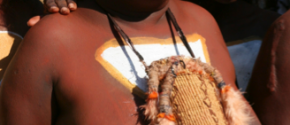Earlier this year, Navi Pillay, the United Nations High Commissioner for Human Rights came to Australia on her first official visit to discuss rights issues with the Government, the Australian Human Rights Commission, as well as Aboriginal and Torres Strait Islander communities and non-governmental organizations. During her visit to Darwin, she met with Aboriginal leaders. Women from Galiwin’ku (Elcho Island, North East Arnhem Land) who are part of the Makarr Dhuni Forum wrote this letter together to Ms Pillay:
13th May 2011
Dear Navi Pillay,
RE: Yolngu Madayin Rom (sacred law) governing Yolngu women in North East Arnhem Land.
We the Yolngu women of Galiwin’ku, North East Arnhem Land, Northern Territory, Australia wish to inform you of our opinions about women’s rights and responsibilities under our Yolngu law.
In our culture, the symbol of a woman is a sacred and holy dilli bag. This bag carries the law in the same way as a woman carries her child in her womb. Women therefore are carrying and maintaining the discipline, the moral teaching and the law in our community. For this reason women are very highly respected and seen as holy. Their bodies are seen as sacred, as are their children according to the djalkirri rom (foundation law).
Nimbi Gandangu – wearing the dilly bag at the closing of the Yolngu Ngarra (Parliamentary sitting), before assenting to the law. Photo used with permission. Copyright Makarr Dhuni Forum
One of the practices that protects women and children is the relationship with our mother’s mother’s clan (mari pulu). This clan acts as an asylum or safe house for anyone who wishes to escape persecution or violence. The perpetrators understand that they are not allowed to set foot in that area. The maris will act as a lawyer /mediator to resolve the issues. Another layer of this complex legal system involves the Djungaya (manager/facilitator) who polices the implementation of the resolution.
We are concerned that our Federal and Territory Governments are not acknowledging that we are still subject to our own djalkirri rom (foundation law) created by Wangarr (God) since time immemorial. For this reason we wish to reassure you that there are many laws, practices and protocols that we must adhere to as strong Yolngu women according to the djalkirri rom. It is this law that provides safety and protection for all Yolngu. Yolngu law is within our body, our bones, our blood, connecting everything. It is sacred, as our lives and bodies are sacred, connecting us to the land.
We thank you for taking an interest in our situation and feel hopeful about your visit to Darwin.
Kind Regards,
Nyomba Gandangu
Co-chairperson of the Makarr Dhuni Forum (the second tier of the Yolngu Ngarra – Parliament, representing all of the clans of Elcho Island)
On behalf of The Makarr Dhuni Women’s Forum
To read Navi Pillay’s response to her visit to Australia, see: http://www.abc.net.au/news/2011-05-25/un-rights-chief-attacks-disturbing-policies/2730650
The AHED Project supports the Makarr Dhuni Forum


